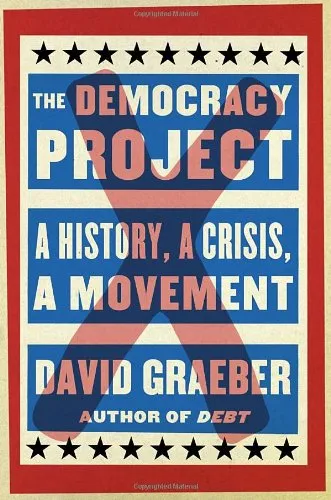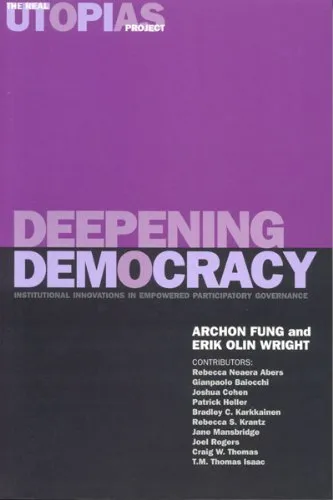The Democracy Project: A History, a Crisis, a Movement
4.3
بر اساس نظر کاربران

شما میتونید سوالاتتون در باره کتاب رو از هوش مصنوعیش بعد از ورود بپرسید
هر دانلود یا پرسش از هوش مصنوعی 2 امتیاز لازم دارد، برای بدست آوردن امتیاز رایگان، به صفحه ی راهنمای امتیازات سر بزنید و یک سری کار ارزشمند انجام بدینکتاب های مرتبط:
معرفی کتاب 'The Democracy Project: A History, a Crisis, a Movement'
کتاب 'The Democracy Project: A History, a Crisis, a Movement' نوشته دیوید گربر، یک بررسی عمیق و آگاهانه از مفهوم دموکراسی و تأثیرات آن بر جوامع معاصر است. این اثر با توجه به تاریخ دموکراسی و جنبشهای اجتماعی اخیر، به بررسی بحرانی که جامعه مدرن با آن مواجه است میپردازد.
خلاصهای از کتاب
دیویوید گربر در کتاب خود خوانندگان را به سفری تاریخی میبرد که از پیدایش ایده دموکراسی شروع میشود و تا چالشها و التهابات سیاسی قرن بیست و یکم ادامه مییابد. گربر با تحلیل دقیق از بحرانهای اجتماعی و سیاسی، به بازتعریف مفهوم دموکراسی میپردازد و نشان میدهد که چرا بسیاری از جنبههای آن همچنان بنیانهای جامعه مدرن را تحت تأثیر قرار میدهند. نقطه قوت کتاب در این است که از دیدگاههای مختلف نظری به دموکراسی نگاه کرده و پیوندی میان تاریخ و شرایط فعلی ایجاد کرده است.
نکات کلیدی
- ارتباط عمیق بین جنبشهای اجتماعی و انقلابهای دموکراتیک.
- تأثیرات اقتصادی و اجتماعی سرمایهداری بر نظامهای دموکراتیک.
- بررسی مسائل بحرانی چون نابرابری و فساد در نظامهای سیاسی.
- نقش تکنولوژی و رسانههای نوین در شکلگیری و تحول دموکراسی.
نقلقولهای معروف از کتاب
«در هر گوشهای از جهان، مردم وقتی از رؤیای دموکراسی صحبت میکنند، منظورشان چیز بسیار متفاوتی است از آنچه نظامهای قدرتمحور میگویند.»
«تکنولوژی میتواند ابزار آزادی باشد، اما همچنین میتواند تبدیل به ابزار نظارت و کنترل شود.»
چرا این کتاب مهم است؟
این کتاب به دلیل بررسی جامع تاریخی و فرهنگی که به دموکراسی اختصاص داده است، اهمیت دارد. در زمانی که شکافهای اجتماعی و اقتصادی به اوج خود رسیدهاند، تحلیلهای گربر نه تنها به درک بهتر از اوضاع کنونی کمک میکند بلکه مسیرهای تازهای برای اندیشیدن درباره آینده دموکراسی را نیز پیش روی ما میگذارد. خواندن این کتاب به خوانندگان امکان میدهد با نگاهی متفاوت و انتقادی به مسائل سیاسی و اجتماعی بنگرند و نقش اثرگذار خود را در تغییرات اجتماعی درک کنند.
Welcome to an exploration of democracy through the lens of acclaimed anthropologist and activist David Graeber. In "The Democracy Project: A History, a Crisis, a Movement," Graeber undertakes a deep investigation into the nature and practice of democracy, examining its roots, current challenges, and the potential pathways it might take. This book resonates as both a history lesson and an urgent call to action, analyzing the Occupy Wall Street movement and its implications for future democratic endeavors.
Detailed Summary of the Book
"The Democracy Project" begins with a vivid recounting of the Occupy Wall Street movement, highlighting its ability to bring societal grievances to the forefront and its critique of the limitations inherent in contemporary democratic systems. Graeber, who played a pivotal role in the movement, provides insider insights on how it unfolded, demonstrating Occupy's potential as a genuine democratizing force that challenged existing power structures.
Graeber delves into the historical foundations of democracy, tracing its origins and evolution over centuries. He contrasts early democratic practices with modern-day implementations, critiquing how contemporary democracies often fail to live up to the ideals they were founded upon—freedom, equality, and participatory governance. According to Graeber, many structures deemed democratic are, in reality, deeply intertwined with oligarchic interests. The book unravels the complexity behind this assertion, exploring how power is concentrated and disenfranchisement occurs on systemic levels.
Throughout the narrative, Graeber offers a critique of economic systems that fuel inequality and considers the role of direct action and civil disobedience in social change. The book does not merely diagnose ailments but also suggests how new forms of social organization might emerge from grassroot movements, envisioning a future where participatory democracy could thrive.
Key Takeaways
- The nature of democracy is deeply contested and complex, requiring continuous re-evaluation and renewal.
- The Occupy movement exemplifies potential pathways toward realizing more authentic forms of democratic engagement.
- Current democratic systems are often underpinned by unequal power relations that need addressing to ensure true participation and representation.
- Direct action and civil disobedience have historic precedence as powerful tools for social change and democratic advancement.
- An equitable society requires rethinking and potentially restructuring the bonds between capitalism and democracy.
Famous Quotes from the Book
"The ultimate hidden truth of the world is that it is something we make and could just as easily make differently."
"In a world where the acquisition of wealth is seen as the ultimate goal, those with wealth are seen as the only ones with right to determine how the world should be structured."
"For a truly democratic system, that is, one where everyone really has an equal say and an equal share of wealth, political struggle must focus first and foremost on social inequality."
Why This Book Matters
"The Democracy Project" is a critical resource for anyone questioning the status quo of political power and governance. Graeber's book provides an important framework to understand the mechanisms through which democracy can be revitalized. As societies globally grapple with crises of representation, economic disparity, and the failures of institutional frameworks, Graeber offers a hopeful perspective that change is possible through collective action and grassroots democracy.
Furthermore, the book captures the zeitgeist of its time, emphasizing how moments of apparent disorder, like Occupy Wall Street, can give rise to meaningful dialogues on the future of democratic societies. It is a crucial read for those interested in political theory, social movements, or anyone who desires a more equitable society.
دانلود رایگان مستقیم
شما میتونید سوالاتتون در باره کتاب رو از هوش مصنوعیش بعد از ورود بپرسید
دسترسی به کتابها از طریق پلتفرمهای قانونی و کتابخانههای عمومی نه تنها از حقوق نویسندگان و ناشران حمایت میکند، بلکه به پایداری فرهنگ کتابخوانی نیز کمک میرساند. پیش از دانلود، لحظهای به بررسی این گزینهها فکر کنید.
این کتاب رو در پلتفرم های دیگه ببینید
WorldCat به شما کمک میکنه تا کتاب ها رو در کتابخانه های سراسر دنیا پیدا کنید
امتیازها، نظرات تخصصی و صحبت ها درباره کتاب را در Goodreads ببینید
کتابهای کمیاب یا دست دوم را در AbeBooks پیدا کنید و بخرید
1358
بازدید4.3
امتیاز50
نظر98%
رضایتنظرات:
4.3
بر اساس 0 نظر کاربران
"کیفیت چاپ عالی بود، خیلی راضیام"
Questions & Answers
Ask questions about this book or help others by answering
No questions yet. Be the first to ask!



